
23 min
0
03.11.2024
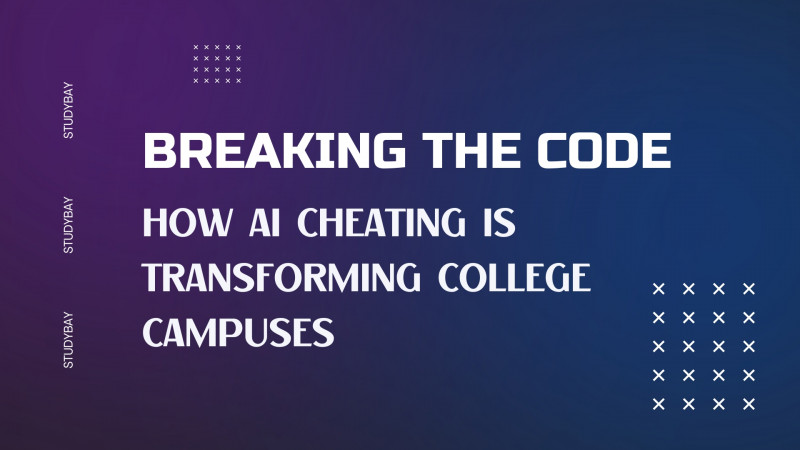
AI has come a pretty long way from its earliest iterations. Large Language Models have “learned” a lot about what works and what doesn’t in academia. However, this has become a problem for many college lecturers and teaching assistants. A significant question comes to light in these considerations: Is using AI cheating?
- Check Yourself - True or False Quiz
- Chatting or Cheating: Does ChatGPT Endanger Educational Integrity?
- Studybay Survey: Revolution or Risk? The Explosive Impact of AI on Student Success and Ethics in Education
- Echoing Student Concerns: Is Education Falling Behind in the AI Race?
- Unveil the Reasons: Why do Students Cling to Human Guidance over AI's Digital Wisdom in Their Studies?
- The Golden State's Academic Dilemma: Why California's Students Turn to Writing Services
- Institutional Responses
- Navigating the AI Minefield: The Evolving Challenge of Academic Integrity
- FAQ
Because of how fast these changes have happened, most people don’t know what AI is capable of, especially in academia. How well do you know the capabilities of AI currently? The following quiz will help you determine what you know as far as this new technology is concerned.
Check Yourself - True or False Quiz
Chatting or Cheating: Does ChatGPT Endanger Educational Integrity?
AI language models have significantly impacted how students and administrators see today's educational landscape. AI writing assistants can now craft coherent essays, research papers, and creative pieces with remarkable fluency. This technology offers students a powerful aid in ideating, structuring, and refining their written assignments.
Yet, AI writing assistance for a paper, as easy as it is, raises several ethical and moral dilemmas. That’s not even to say that AI and LLM models are accurate. According to Khatun and Brown, ChatGPT’s accuracy varies between 4.8% and 26%. Teachers such as Nicholas Tampio, a professor of political science, see AI as allowing students to craft an entire paper without actually learning anything.
This isn’t the only side of the argument, however. Proponents see AI writing as assistance, not cheating. When used transparently, AI can become a collaborative partner, enhancing students' writing abilities rather than replacing them.
Some educators like Shital Thekdi, associate professor of analytics & operations, reframe the question to her students. Instead of looking at what ChatGPT and other LLMs are capable of, what can you do that it can’t?
Thekdi suggests students should look at the reality where an AI will replace a lot of the typical jobs that are currently available, leading students to pivot into different areas. Her approach addresses the idea of academic integrity in a unique way. Instead of having students rely on an LLM, she suggests that they look at ways they are better than the AI agent.
Using AI to cheat is a concern, but only when academia isn’t interested in embracing AI as a tool and instead sees it as a threat. The European Network for Academic Integrity (ENAI) has already developed guidelines on how AI can be used ethically and transparently, both by students and their professors. But is AI writing cheating, or is it just a tool that can help students learn? As we discovered in our own studies, AI can be a game-changer in academia.
Studybay Survey: Revolution or Risk? The Explosive Impact of AI on Student Success and Ethics in Education
Is using AI to write an essay cheating? Some students think that using AI in any academic situation is wrong, while others think that it’s the next logical step in the evolution of education tools.
AI cheating is an ethical consideration, but only if students are prevented from using AI to help with their work. There’s no question that it can be helpful in the proper context. Like any tool, when used correctly, it can cause massive success when students learn how to use it.
Academia’s reluctance to embrace AI learning shows a lack of appreciation for its disruptive nature. Even if students are banned from using these tools, there’s a good likelihood they will continue to do so.
Studybay surveyed 1,000 students aged 18 to 32 across the US. Each student was deeply immersed in their higher education journey, ranging from undergraduate to doctoral studies.
Key Findings of the Study
- 7% of all students polled stated that they were unaware of ChatGPT.
- 68% of students said that their lecturers never discussed using AI in their work.
Students mentioned that their use of AI in their academic workload was varied:
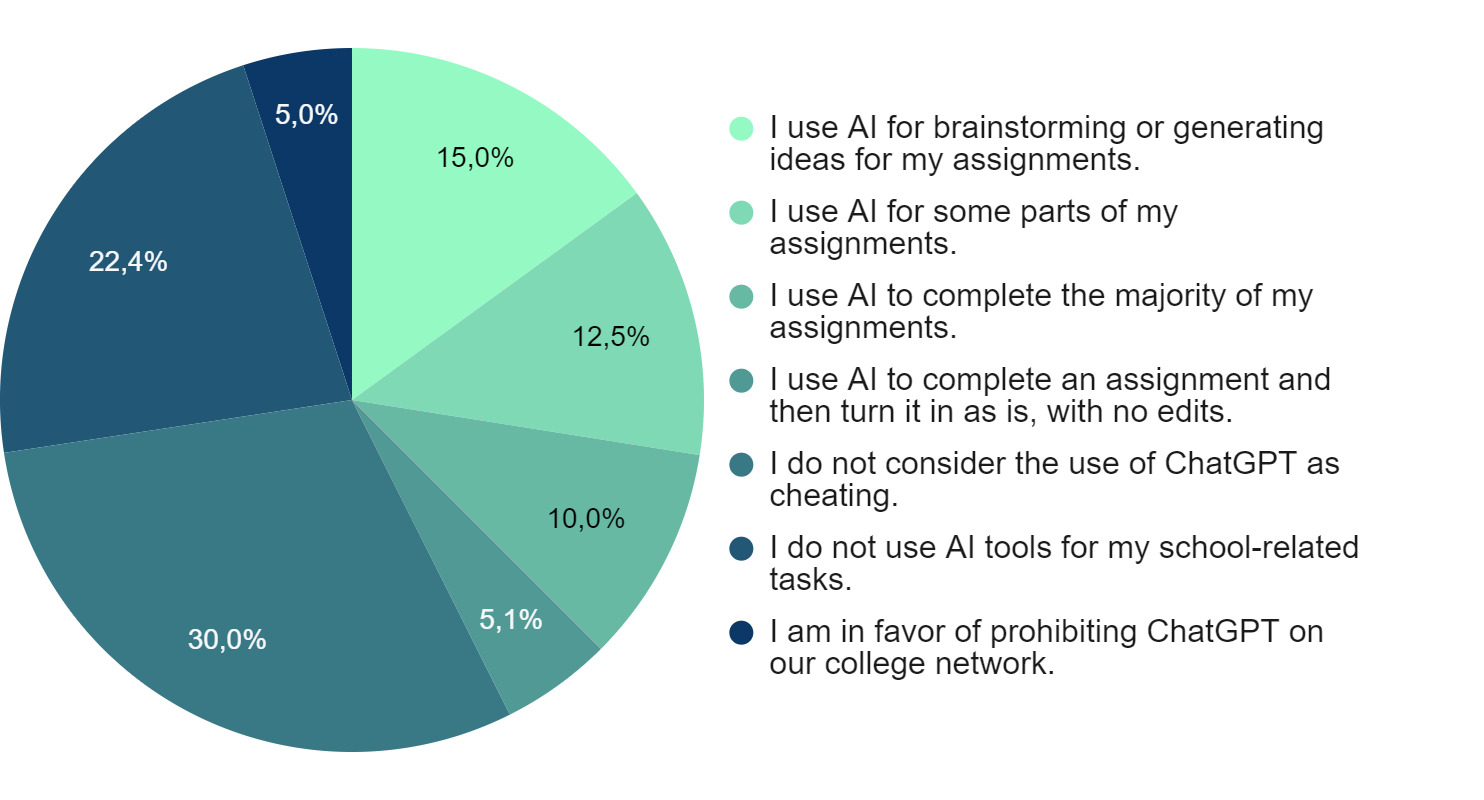
- 30% of students surveyed didn’t see using ChatGPT generating their work as AI cheating essays.
- 5% of students thought that tools like ChatGPT should not be allowed in educational settings.
- 35% of students regularly use AI tools in their academic work.
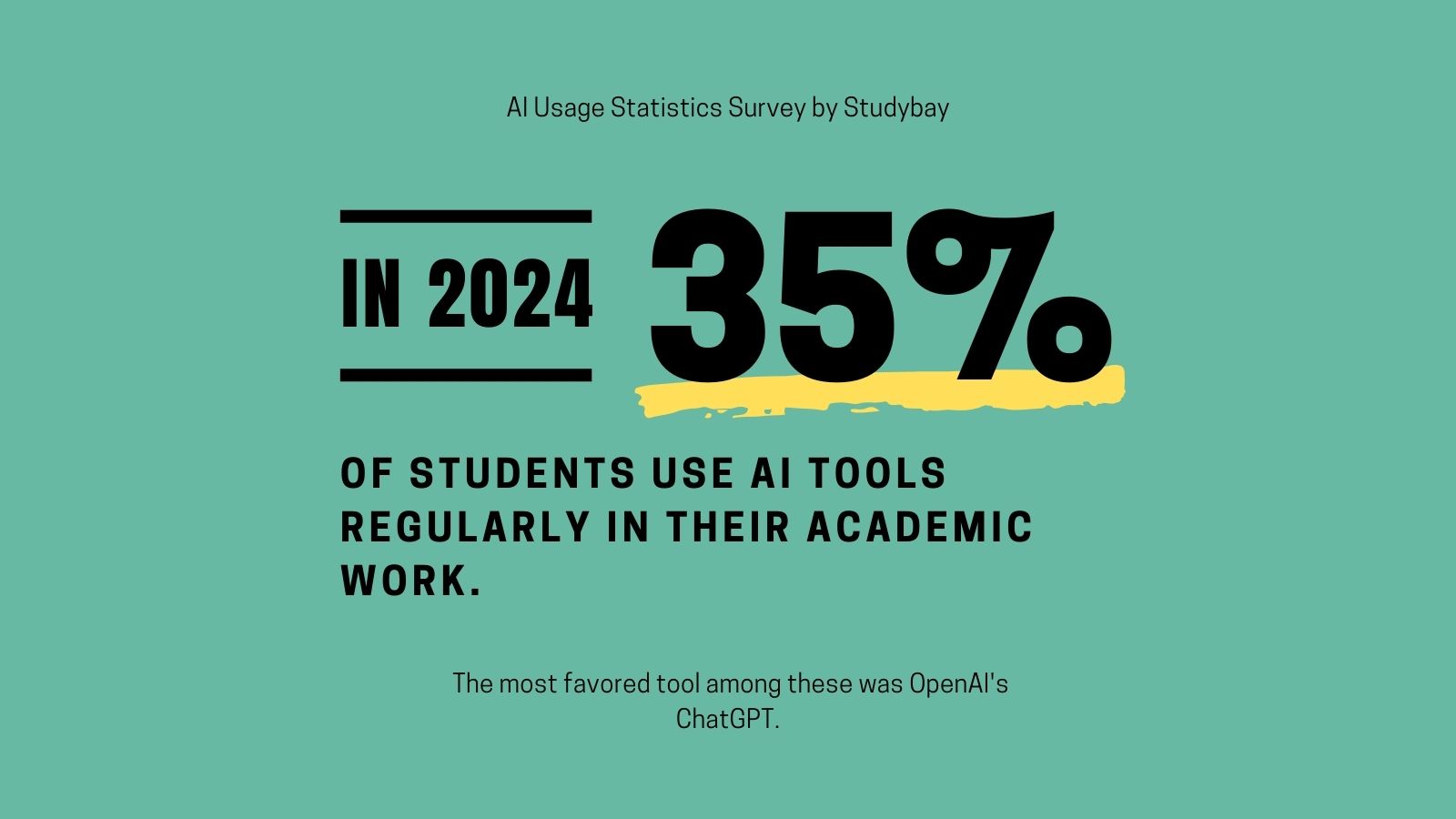
- 22% respondent-students acknowledged using ChatGPT or similar AI applications to help them with exams and tests.
- Three-quarters (75%) of regular users have reported grade enhancements following the integration of generative AI into their academic routines.
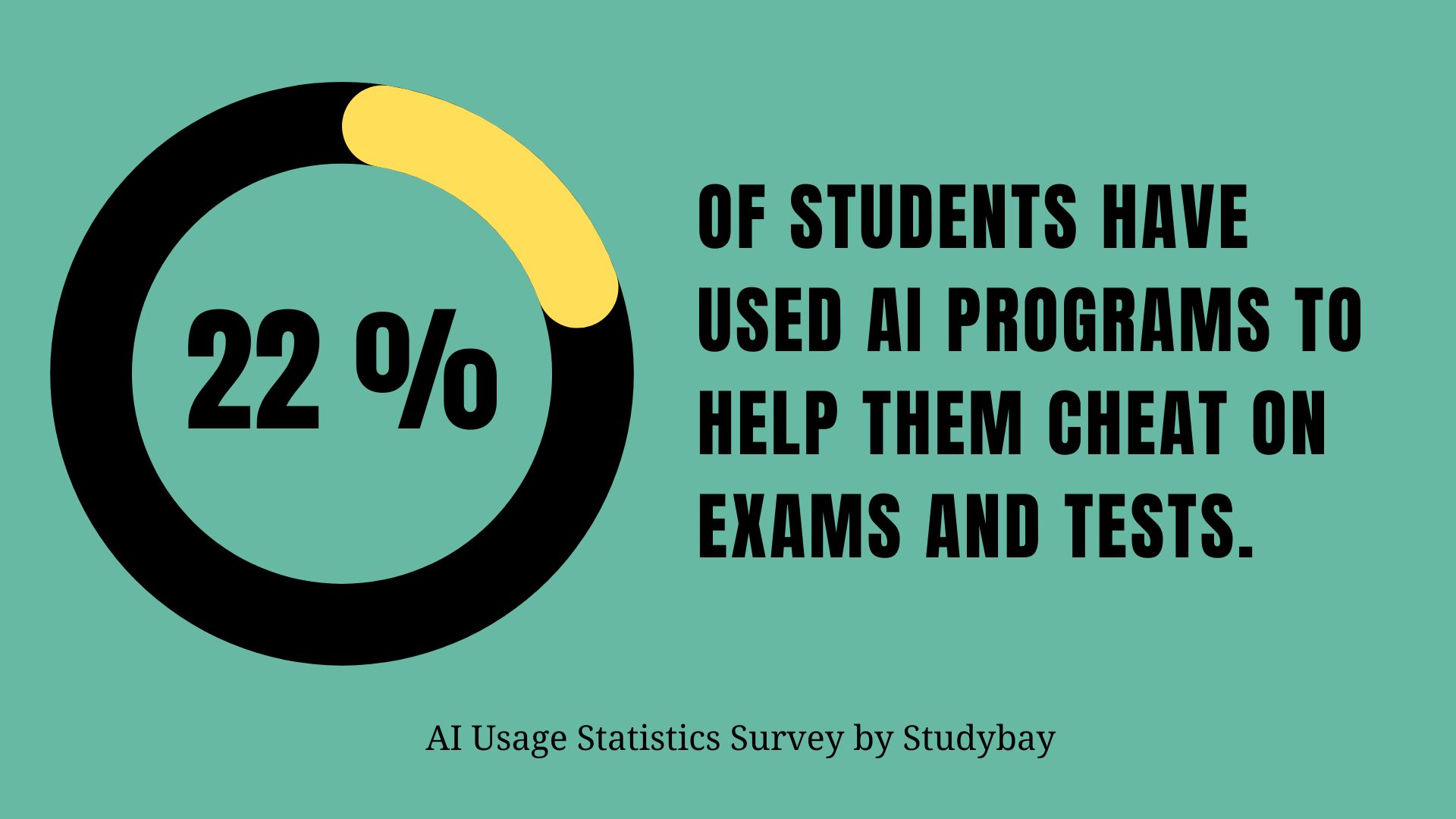
Additional Findings
- OpenAI’s CharGPT was the number one AI tool for academic work.
- Marketing, Business, and Psychology majors were the trailblazers in adopting AI tools like ChatGPT for academic work. They primarily use it to look at human behavior objectively and ascertain insights into why people do what they do. Their usage shows a determination to amplify their academic exploration
- Accounting majors are wary about using AI because they are unconvinced it can offer them the level of accuracy that their profession demands. They prefer having more control over their data than less.
- Medical students are the most reluctant to use AI tools in their jobs because of the inherent ethical concerns in their professions. Human judgment is usually the basis of many of their decisions, and AI simply can’t replicate this yet.
Echoing Student Concerns: Is Education Falling Behind in the AI Race?
Students also have a voice in how AI plays a part in their academic lives. As part of Studybay’s research, we talked to several students to gain insights into how they saw AI as a tool in their educational journeys.
John, a 19-year-old student, sees AI as a boon and says that it helps him study. “I think it's great to augment human intelligence and allow us to learn more efficiently,” he says. “AI tutors provide personalized help and catch gaps in my knowledge.” Overall, he was very positive about seeing AI used more in academia.
Another student, Jessica, 18, uses AI as an outlining tool for her academic studies. “It saves me so much time!” she stated. “I'm excited about the day when AI tutors can teach students one-on-one at a low cost.” She noted that implementing this will likely make education more accessible and equitable to all.
Jennifer, 19, was averse to seeing more AI in the classroom. “I think relying too much on technology can be unhealthy,” she says. “While AI tutors seem convenient, I value the classroom community and discussions with human professors.” Jennifer expects that this might impact the human element in academia, and it’s something she thinks that classes should not lose.
Lauren, 21, is entirely against the use of AI tools. “Education is meant to expand minds and bring people together - things technology can't ever fully replicate,” she says. Lauren notes that AI will have challenges presenting things in a digestible way for students. She’s also concerned that the course content will lose its impact if offered by an AI tool instead of a real human tutor.
Hear more student voices come alive, thanks to the innovative use of play.ht:
All of these are valid concerns about AI-generated work. It highlights that not all students are interested in using AI as a tool, and some are concerned about how it would affect their peers’ learning ability. Yet others see it as a blessing to their academic journey.
We consulted ChatGPT to get its perspective on the idea of replacing teachers with artificial intelligence, and here is the response.
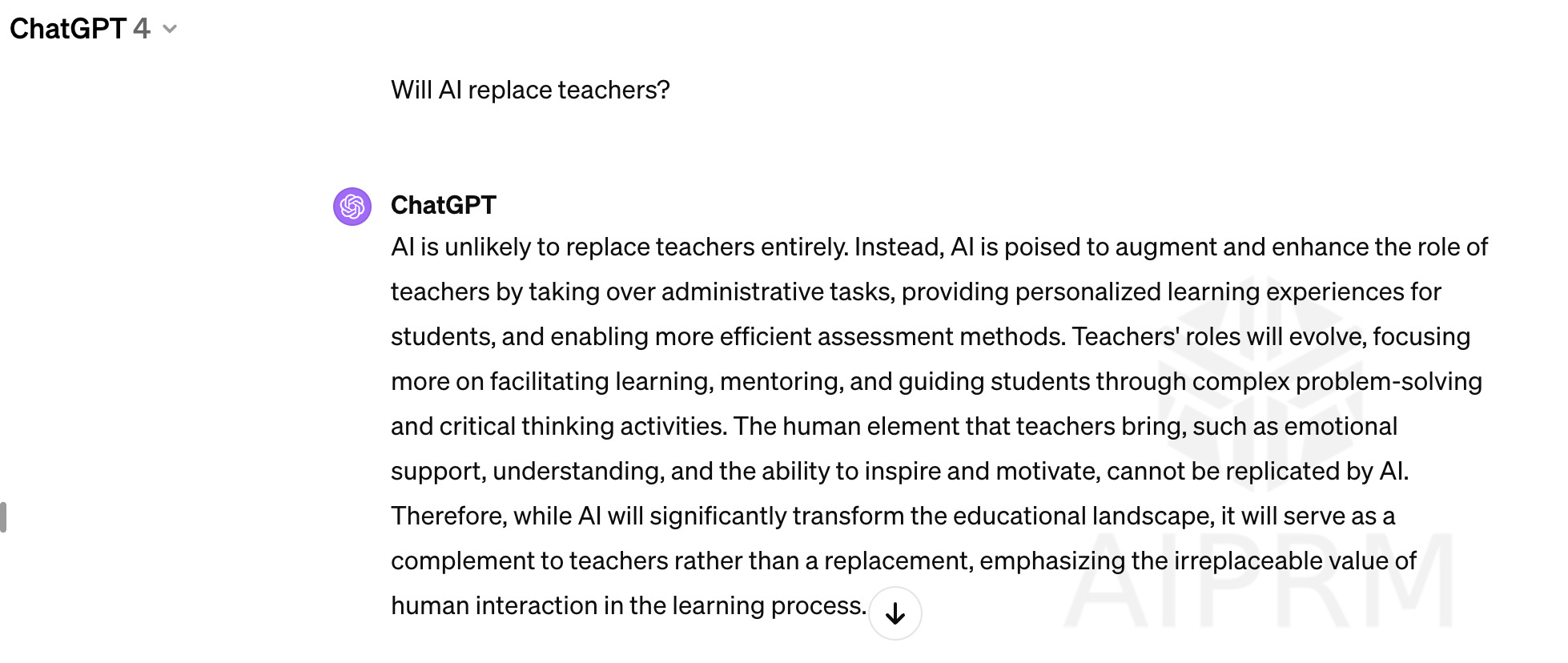
Unveil the Reasons: Why do Students Cling to Human Guidance over AI's Digital Wisdom in Their Studies?
If AI is such a massive gift to academia, why do so many students prefer human tutors to AI ones? Several reasons come to light in the study, including:
- Personal Connection and Empathy: Human tutors and instructors can provide a level of emotional support and understanding that AI systems currently lack. They can pick up on subtle cues, adjust their teaching approach based on students' reactions, and offer encouragement when needed. This personal connection fosters a more conducive learning environment and helps students stay motivated.
- Contextual Understanding: Despite AI's impressive natural language processing capabilities, human experts have a deeper understanding of context and nuance. They can better grasp the underlying concepts, provide real-world examples, and tailor explanations to students' specific needs and backgrounds. Some AI agents like ChatGPT have limited knowledge of the real world, and that expertise stopped as of 2021.
- Critical Thinking and Creativity: While AI excels at processing and generating information, human educators are better equipped to cultivate critical thinking, problem-solving skills, and creativity in students. They can challenge students to think outside the box, question assumptions, and develop innovative solutions. AI can’t come up with new ideas or ways of presenting things. It can only adapt what it already knows.
- Ethical and Social Considerations: Education goes beyond mere knowledge transfer; it also involves instilling values, ethics, and social awareness. Human instructors can better address these intangible aspects, facilitating discussions on complex societal issues and promoting responsible decision-making. AI agents are unaware of ethics and social considerations, and they never factor into their instructions.
- Trust and Accountability: Some students may still have reservations about entrusting their education entirely to AI systems, preferring the accountability and transparency that comes with human guidance. Human instructors can provide personalized feedback, clarify misunderstandings, and adapt their teaching methods based on individual student needs. AI has a hard time referencing its sources, making it less likely for students to trust what it says easily.
While AI continues to be developed rapidly, it may need many more iterations before it can challenge the depth of instruction of a human teacher.
The Golden State's Academic Dilemma: Why California's Students Turn to Writing Services
One of the things that popped up in our 2023 survey involving 50,000 students, was how often students in California turned to online writing services to help them with their academic work.
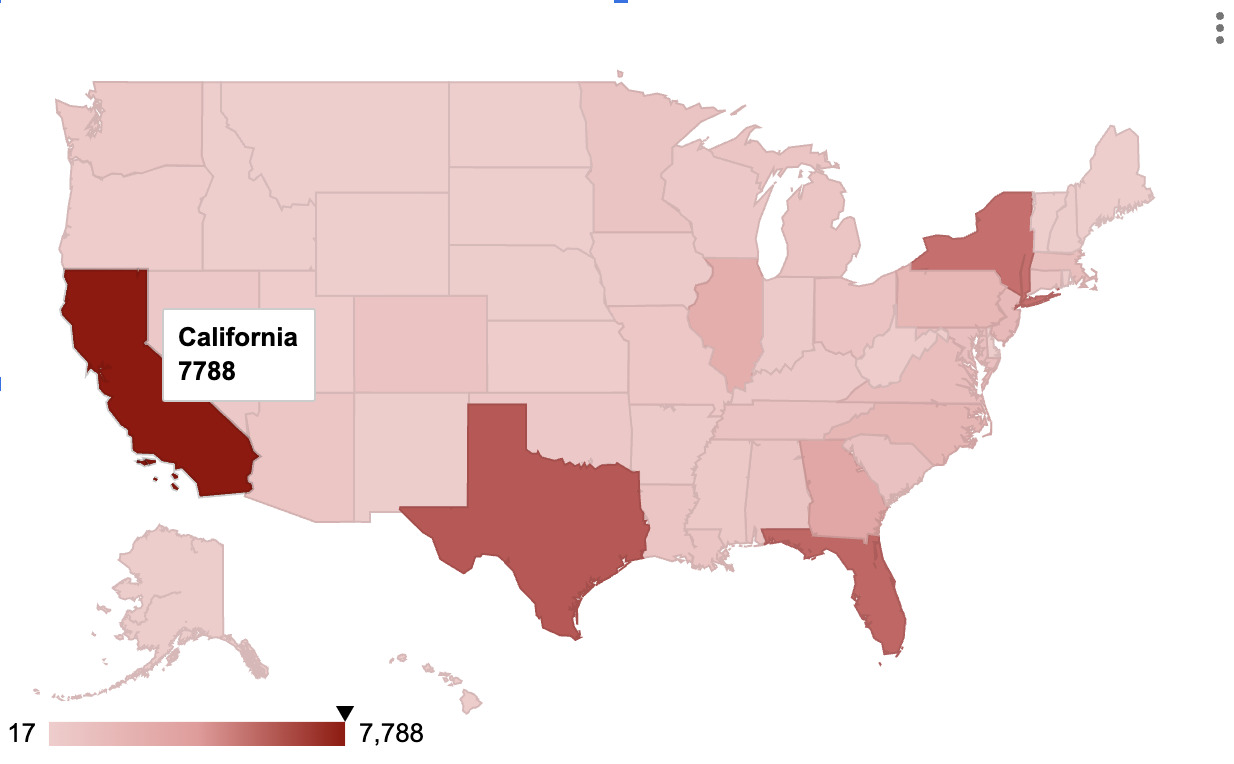
While there was a higher-than-average concentration of students who used academic writing services online in other states like Texas, Florida, and New York, those numbers paled in comparison to California. What’s happening with students in that region that makes them seek out homework help online?
Several hypotheses could be formed based on what we know about California’s population demographics and the competitiveness of its schools:
- Academic Pressure and Competition: California is home to several prestigious universities like Stanford and UCB. The intense pressure to excel academically, particularly in rigorous programs or selective institutions, may drive some students to seek external writing assistance more frequently.
- Cost of Living and Financial Considerations: The high cost of living in certain parts of California, particularly in areas with prestigious universities, could lead some students to seek writing assistance to balance academic demands with the need to work or manage their finances.
- Technological Adoption and Awareness: If students in California are generally more technologically savvy or aware of online writing services, they may be more likely to explore and repeatedly use such resources.
- Language and Demographic Factors: California is a diverse state with a significant population of non-native English speakers or students from immigrant backgrounds. This could contribute to a higher demand for writing assistance among certain demographic groups.
Studybay may likely focus on one of these hypotheses for its next survey into California students' academic habits.
Institutional Responses
AI isn’t going anywhere, and many academic institutions are slowly accepting that some level of compromise may be necessary. They aren’t embracing the change this technology brings outright, but they are cautiously exploring options. Even so, some educational institutions have taken a hardline stance, trying to dig in against the prevailing tide of technology.
Some forward-thinking universities are exploring allowing students to use AI to plan their essays. Some are going even further, looking at ways to use AI in classrooms to advance learning.
These institutions may develop guidelines and best practices for leveraging AI writing aids and research assistants in coursework, emphasizing that students must provide substantial original contributions and credit AI's role transparently. AI literacy could be incorporated into curricula, teaching students how to prompt AI effectively while avoiding over-reliance.
While challenges around AI and cheating remain, a pragmatic institutional approach would be to accept AI's inevitable presence and reframe education to make the most of intelligence augmentation. Educators could serve as guides, teaching students ethical AI use while still prioritizing uniquely human skills like creativity, critical thinking, and emotional intelligence.
Navigating the AI Minefield: The Evolving Challenge of Academic Integrity
Trying to stay ahead of AI in an academic setting is almost like an arms race. AI develops in leaps and bounds, far faster than we can catch up to it. Even so-called AI checkers are only guessing whether something is AI-generated or not half the time.
If colleges want to get ahead of AI, they must let their students use it transparently. Cheating with AI is only an issue if AI, one of the most powerful tools students can use, is banned from the classroom. If students have a tool as powerful as AI, why would academia stop them from using it?
If colleges want students to keep their academic integrity, they should allow the use of AI tools for doing work. However, the guidelines for using those tools should be detailed and outlined without any ambiguities. That way, they can underline what counts as students cheating with AI and those legitimately utilizing the technology.
References:
- Spector, Carrie. "What Do AI Chatbots Really Mean for Students and Cheating?" Stanford Graduate School of Education, 31 Oct. 2023, ed.stanford.edu/news/what-do-ai-chatbots-really-mean-students-and-cheating.
- Selwyn, Neil. "Six Reasons Artificial Intelligence Technology Will Never Take Over from Human Teachers." EduResearch Matters, Australia Association for Research in Education, 12 June 2018, blog.aare.edu.au/six-reasons-artificial-intelligence-technology-will-never-take-over-from-human-teachers/.
- Foltynek, Tomas, et al. "ENAI Recommendations on the Ethical Use of Artificial Intelligence in Education." International Journal for Educational Integrity, vol. 19, no. 12, 2023, https://doi.org/10.1007/s40979-023-00133-4.
- Fowler, Geoffrey. "Prove False-Positive AI Detection: Turnitin, GPTZero." The Washington Post, 14 Aug. 2023, www.washingtonpost.com/technology/2023/08/14/prove-false-positive-ai-detection-turnitin-gptzero/.
FAQ
What is AI cheating, and how is it impacting college campuses?
How are colleges detecting and combating AI cheating?
What are the consequences for students caught cheating with AI?
What future implications does AI cheating have for higher education?
How does AI detect cheating?



